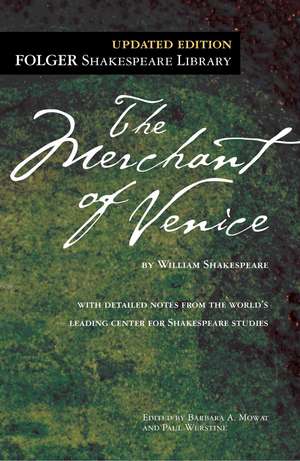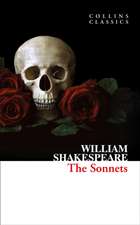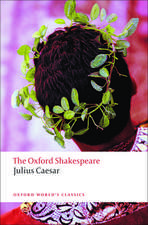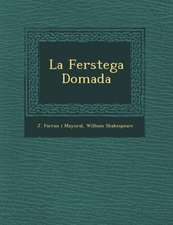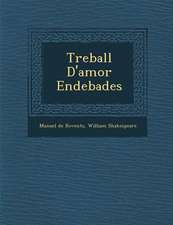The Merchant of Venice: Folger Shakespeare Library
Autor William Shakespeare Editat de Dr. Barbara A. Mowat, Paul Werstine Ph.D.en Limba Engleză Paperback – 19 ian 2004
Bassanio and Portia also face a magnificent villain, the moneylender Shylock. In creating Shylock, Shakespeare seems to have shared in a widespread prejudice against Jews. Shylock would have been regarded as a villain because he was a Jew. Yet he gives such powerful expression to his alienation due to the hatred around him that, in many productions, he emerges as the hero.
Portia is most remembered for her disguise as a lawyer, Balthazar, especially the speech in which she urges Shylock to show mercy that “droppeth as the gentle rain from heaven.”
The authoritative edition of The Merchant of Venice from The Folger Shakespeare Library, the trusted and widely used Shakespeare series for students and general readers, includes:
-Freshly edited text based on the best early printed version of the play
-Newly revised explanatory notes conveniently placed on pages facing the text of the play
-Scene-by-scene plot summaries
-A key to the play’s famous lines and phrases
-An introduction to reading Shakespeare’s language
-An essay by a leading Shakespeare scholar providing a modern perspective on the play
-Fresh images from the Folger Shakespeare Library’s vast holdings of rare books
-An up-to-date annotated guide to further reading
Essay by Alexander Leggatt
The Folger Shakespeare Library in Washington, DC, is home to the world’s largest collection of Shakespeare’s printed works, and a magnet for Shakespeare scholars from around the globe. In addition to exhibitions open to the public throughout the year, the Folger offers a full calendar of performances and programs. For more information, visit Folger.edu.
Din seria Folger Shakespeare Library
-
 Preț: 42.25 lei
Preț: 42.25 lei -
 Preț: 103.74 lei
Preț: 103.74 lei -
 Preț: 40.39 lei
Preț: 40.39 lei -
 Preț: 137.73 lei
Preț: 137.73 lei -
 Preț: 41.38 lei
Preț: 41.38 lei -
 Preț: 41.38 lei
Preț: 41.38 lei -
 Preț: 42.44 lei
Preț: 42.44 lei -
 Preț: 40.39 lei
Preț: 40.39 lei -
 Preț: 44.50 lei
Preț: 44.50 lei -
 Preț: 40.15 lei
Preț: 40.15 lei -
 Preț: 63.48 lei
Preț: 63.48 lei -
 Preț: 63.89 lei
Preț: 63.89 lei -
 Preț: 64.93 lei
Preț: 64.93 lei -
 Preț: 68.84 lei
Preț: 68.84 lei - 63%
 Preț: 17.37 lei
Preț: 17.37 lei -
 Preț: 68.02 lei
Preț: 68.02 lei -
 Preț: 63.66 lei
Preț: 63.66 lei -
 Preț: 68.02 lei
Preț: 68.02 lei -
 Preț: 70.07 lei
Preț: 70.07 lei -
 Preț: 134.88 lei
Preț: 134.88 lei -
 Preț: 137.97 lei
Preț: 137.97 lei -
 Preț: 136.91 lei
Preț: 136.91 lei -
 Preț: 100.84 lei
Preț: 100.84 lei -
 Preț: 65.53 lei
Preț: 65.53 lei -
 Preț: 70.07 lei
Preț: 70.07 lei -
 Preț: 66.35 lei
Preț: 66.35 lei -
 Preț: 67.39 lei
Preț: 67.39 lei -
 Preț: 91.07 lei
Preț: 91.07 lei
Preț: 40.15 lei
Nou
7.68€ • 8.04$ • 6.36£
Carte disponibilă
Livrare economică 15-29 martie
Specificații
ISBN-10: 0743477561
Pagini: 304
Dimensiuni: 106 x 171 x 23 mm
Greutate: 0.15 kg
Ediția:Reprint
Editura: Simon&Schuster
Colecția Simon & Schuster
Seria Folger Shakespeare Library
Notă biografică
Barbara A. Mowat is Director of Research emerita at the Folger Shakespeare Library, Consulting Editor of Shakespeare Quarterly, and author of The Dramaturgy of Shakespeare’s Romances and of essays on Shakespeare’s plays and their editing.
Paul Werstine is Professor of English at the Graduate School and at King’s University College at Western University. He is a general editor of the New Variorum Shakespeare and author of Early Modern Playhouse Manuscripts and the Editing of Shakespeare and of many papers and articles on the printing and editing of Shakespeare’s plays.
Descriere
Textul de pe ultima copertă
The Merchant of Venice is best known for its complex and ambiguous portrait of the Jewish moneylender Shylock--and of European anti-Semitism. Fascinating in its engagement with prejudice, the play is also a comedy of cross-dressing and disguise, and a dramatic exploration of justice, mercy, and vengeance.
This volume contains the full text of the play with explanatory footnotes and marginal glosses for contemporary readers. An extensive introduction and well-rounded selection of background materials not only illuminate anti-Semitism in early modern England but also provide context for other facets of the play, including its comic plot of love and marriage, its examination of commerce and international trade, and its themes of revenge and the law.
Recenzii
Even as the New Kittredge Shakespeare series glances back to George Lyman Kittredge's student editions of the plays, it is very much of our current moment: the slim editions are targeted largely at high school and first-year college students who are more versed in visual than in print culture. Not only are the texts of the plays accompanied by photographs or stills from various stage and cinema performances: the editorial contributions are performance-oriented, offering surveys of contemporary film interpretations, essays on the plays as performance pieces, and an annotated filmography. Traditional editorial issues (competing versions of the text, cruxes, editorial emendation history) are for the most part excluded; the editions focus instead on clarifying the text with an eye to performing it. There is no disputing the pedagogic usefulness of the New Kittredge Shakespeare's performance-oriented approach. At times, however, it can run the risk of treating textual issues as impediments, rather than partners, to issues of performance. This is particularly the case with a textually vexed play such as Pericles: Prince of Tyre . In the introduction to the latter, Jeffrey Kahan notes the frequent unintelligibility of the play as originally published: "the chances of a reconstructed text matching what Shakespeare actually wrote are about 'nil'" (p. xiii) But his solution to use a "traditional text" rather than one corrected as are the Oxford and Norton Pericles obscures how this "traditional text," including its act and scene division, is itself a palimpsest produced through three centuries of editorial intervention. Nevertheless, the series does a service to its target audience with its emphasis on performance and dramaturgy. Kahan's own essay about his experiences as dramaturge for a college production of Pericles is very good indeed, particularly on the play's inability to purge the trace of incestuous desire that Pericles first encounters in Antioch. Other plays' cinematic histories: Annalisa Castaldo's edition of Henry V contrasts Laurence Oliver's and Branagh's film productions; Samuel Crowl's and James Wells's edition of (respectively) I and 2 Henry IV concentrate on Welle's Chimes at Midnight and Gus Van Sant's My Own Private Idaho ; Patricia Lennox's edition of As You Like It offers an overview of four Hollywood and British film adaptations; and John R. Ford's edition of A Midsummer Night's Dream provides a spirited survey of the play
